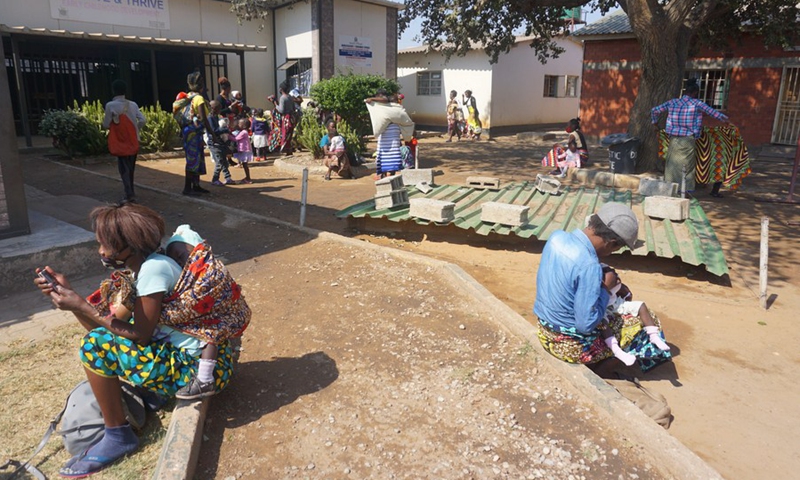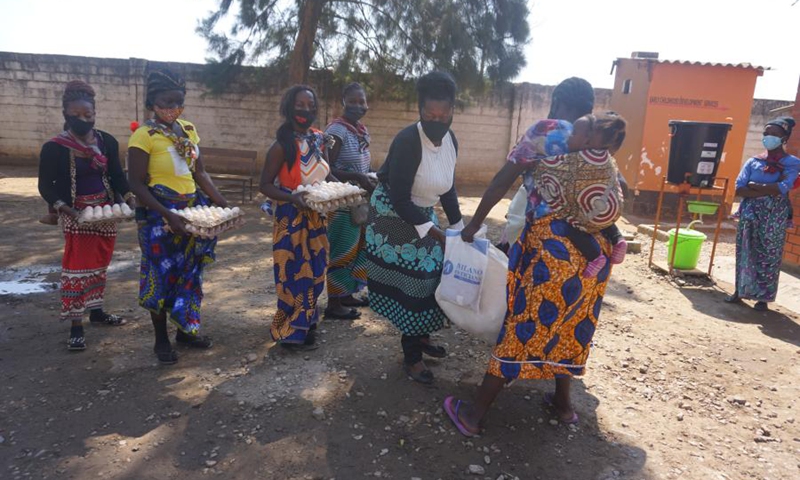
Beneficiaries of the food supplement program run by the Women's Federation for World Peace in Zambia wait for rations at a health facility in Lusaka, Zambia, on July 23, 2021.(Photo: Xinhua)

Beneficiaries of the food supplement program run by the Women's Federation for World Peace in Zambia hold received rations at a health facility in Lusaka, Zambia, on July 23, 2021.(Photo: Xinhua)
It is a Friday and 12-year-old Henry Chileshe is already at a health facility eagerly waiting for the arrival of a van carrying a range of food items.
Like many individuals from vulnerable households in Lusaka, the capital of Zambia, Chileshe has become accustomed to visiting a health facility once every week to receive soya flour and some eggs among other things.
"I collect on behalf of my mother who has been unwell for some time and is unable to come through herself," he explains while putting the eggs properly so they do not break.
He added that he and his four siblings also benefit from the food supplements intended for his mother, an HIV-positive patient.
The food supplement program that Chileshe and others have been benefiting from is an initiative of the Women's Federation for World Peace (WFWP) in Zambia that started over a decade ago.
The organization works in collaboration with health facilities. Health facilities identify vulnerable children and adults in need of food supplements and WFWP provides food to those in need for free.
Beneficiaries are often children suffering from malnutrition and adults who are chronically ill and not able to meet their own nutritional needs.
"Initially, the idea was to help mothers of malnourished children meet dietary needs of these children. Vulnerable adults who are HIV-positive and are in need of food supplements are also given," explained Evelyn Silwamba-Daka, WFWP Secretary in Zambia, who is also in charge of WFWP food program.
Silwamba-Daka mentioned that WFWP food program is being implemented in partnership with two government-run health facilities located in Lusaka's low-income communities of Mandevu and Garden and currently has over 150 beneficiaries.
She further stressed the need for more public-private partnerships to help meet the high demand for food supplements in low-income communities, stating that in the face of the COVID-19 pandemic, most vulnerable homes are now relying on food supplements to avert hunger and starvation.
She also revealed as a way of economically empowering mothers of malnourished children, WFWP also conducts free tailoring courses and helps them purchase sewing machines so that they can raise money to buy food for their households.
Twenty four years old Vanessa Siamukumbe, also one of the beneficiaries, revealed that the food supplements have been helpful in boosting her children's growth as well as ensuring food security in her home.
Siamukumbe noted that prior to being on the program, her twins who are almost two years old now, were underweight. But after a few months of feeding them porridge made from soya flour, the children registered great improvements.
"The twins are now healthy and very active. They have since gained weight," she said.
"Even my four-year child is also benefiting from the same food stamps I get for the twins," she said.
Siamukumbe said that the food supplements have been helpful in ensuring that her children always have something to eat when she does not have the resources to buy food.
Mirriam Bwalya, who is a mother of five, explained that many homes are not able to make ends meet because of the economic malaise resulting from the COVID-19 pandemic.
"I shudder to imagine what would have happened if this food program was not there. Vulnerable families are now literally relying on food supplements to avert hunger and starvation," Bwalya said.
